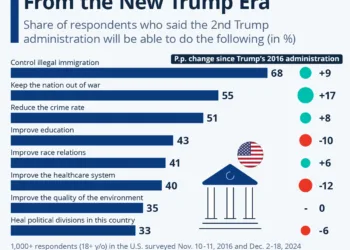Germany’s Political Landscape and Pressing Challenges Ahead of the 2023 Elections
As Germany approaches a pivotal moment with the upcoming federal elections, the atmosphere is charged with political tension and division. This snapshot provides an in-depth look at the various challenges facing the nation, as seen through differing political lenses.
The Political Divide: Who Cares About What?
Left-Wing Perspectives: Inflation, Climate Change, and Housing
Individuals identifying as politically left prioritize inflation, climate change, and housing issues as the most pressing challenges facing Germany. This perspective reflects a growing concern about the rising cost of living, as well as the environmental implications of current policies.
As the nation grapples with increased prices for essential goods and energy, the economic consequences of inflation become undeniable. For left-leaning voters, addressing these issues is not just about economics but also about social equity and sustainability. Climate change awareness has surged in recent years, prompting demands for more significant action to combat its effects.
Centrists: Immigration and Economic Woes
Centrists find common ground in acknowledging both immigration and the economic situation as critical issues alongside inflation. As debates heat up, the middle ground appears increasingly influenced by growing fears surrounding immigration and its impact on the economy.
This group is gaining traction in discussions about how best to integrate immigrants while simultaneously fostering economic growth. Many centrists believe it is crucial to navigate the complexities of immigration with sensitivity, emphasizing that the challenges faced cannot be relegated to one side of the political discourse.
Right-Wing Views: Immigration Takes Center Stage
On the right, immigration emerges as the primary concern, overshadowing even inflation and crime. This sentiment, largely championed by parties such as the Christian Democratic Union (CDU/CSU) and the far-right Alternative for Germany (AfD), has dominated media conversations leading up to the elections.
For many right-leaning individuals, the influx of refugees and migrants has raised alarms. Citing economic instability as a consequence of high immigration rates, they argue that Germany’s resources may be stretched too thin, especially in times of financial hardship. The pervasive narrative placing blame on immigration drives a growing rift within society.
The Rise of the AfD: Political Implications
The Alternative for Germany (AfD) has gained substantial traction, predicted to secure nearly 20 percent of the votes in the upcoming elections. This increase attests to a significant shift in public sentiment, as frustrations with Germany’s immigration policies grow amid economic struggles.
The party has capitalized on existing divides, presenting a platform that critiques the country’s previous policies on asylum seekers and immigration. As the AfD gains visibility, many citizens are now questioning traditional party lines and boundary markers, indicating a transformative moment in the German political landscape.
Demographic Context: The Role of Migration in Modern Germany
With nearly 30 percent of Germany’s population comprising first or second-generation migrants, the immigration narrative is one that resonates deeply within the society. Approximately 12.4 million of these are German citizens, showcasing the complex interaction between nationality and migration.
In recent years, Germany has also hosted approximately 2.7 million refugees and 350,000 asylum seekers, according to UNHCR data from 2024. This influx has contributed to the ongoing debate about integration, national identity, and economic viability.
Economic Concerns: Beyond Just Numbers
While inflation remains a key issue across the political spectrum, it is crucial to understand the underlying economic dynamics at play. Rising food and energy prices have compounded public anxiety, leading to a tendency to seek scapegoats for economic faults, often levied against immigrants.
The interplay between perceived economic strain and migration narratives presents a delicate and contentious topic that is shaping political discussions. Citizens are increasingly pushed to confront their beliefs and the policies they support as they assess which leaders will best address their concerns during this election cycle.
Conclusion: The Unfolding Political Drama
As the elections draw near, the competing narratives surrounding Germany’s challenges exemplify the fracturing political landscape. Addressing the issues that matter most to voters—be they economic hardship, immigration, or climate change—will undoubtedly be at the forefront of discussions as the country seeks to define its future.
The outcome of this election will not just shape Germany’s immediate political landscape but will also impact its role within the European Union and beyond. The choices made by voters could have lasting ramifications on policy, public perception, and Germany’s identity on the global stage.






